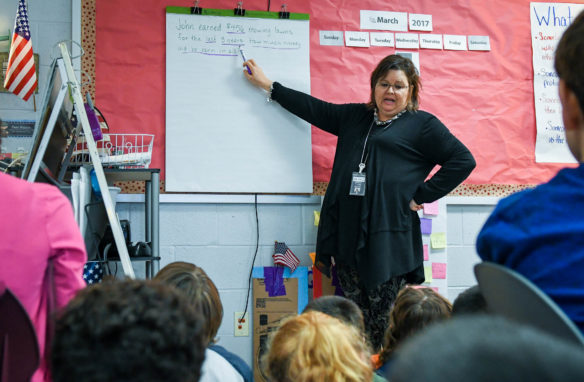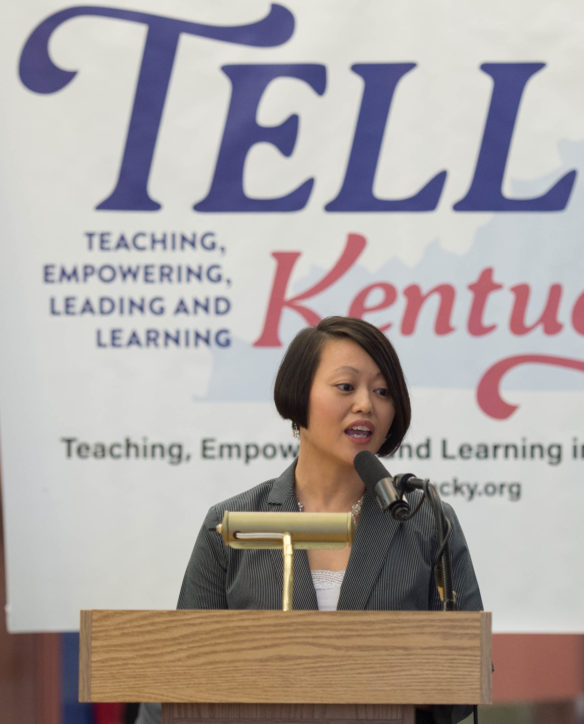
Stephanie Herndon, a 3rd-grade teacher at Clear Creek Elementary (Shelby County), reads a word problem to her class during a math lesson. Herndon serves on a committee that the principal has tasked with analyzing the TELL results and making recommendations on school improvements.
Photo by Bobby Ellis, March 1, 2017
By Brenna R. Kelly
Brenna.kelly@educuation.ky.gov
The year Kim Willhoite became principal of Clear Creek Elementary just happened to coincide with a year when Kentucky teachers take the TELL Survey, the state’s biennial survey of working conditions in the state’s public schools.
The TELL (Teaching, Empowering, Leading and Learning) survey is designed to provide information to help principals, superintendents and state education officials improve the conditions that affect teaching and learning across the state.
“My first year, I hate to say, I didn’t use it,” said Willhoite, who was a first-time principal when she came to the Shelby County school. “I didn’t know how to use it.”
Five years later, Willhoite now sees the survey as one of the best tools for school improvement.
“It’s helped us learn and grow and change as a building so that we can make things better for us and our kids,” she said.
The anonymous online survey was first given in 2011. It covers a wide range of topics, including time, school leadership, teacher leadership, facilities and resources, professional development, community engagement and support, instructional practices and support, student conduct and new teacher support.
The survey is administered by the New Teacher Center, a national nonprofit organization that promotes teacher quality. Educators will take the survey this year from March 1 to 31.

Kim Wilhoite, principal of Clear Creek Elementary School (Shelby County), speaks during the kick-off of the TELL Kentucky Survey. Wilhoite said previous TELL results have helped her make changes that benefit both teachers and students.
Photo by Bobby Ellis, March 1, 2017
“The TELL survey provides an opportunity for Kentucky’s public education practitioners to speak honestly and anonymously about a variety of issues that ultimately have an effect on student learning,” said Robin Hebert, director of the Kentucky Department of Education’s division of Next Generation Professionals. “The information is valuable to improvement planning along the P-12 continuum, as well as local, district and state systems.”
Schools and districts are using the results more and more. In the 2015 survey, the response to a question about whether schools used the previous TELL results for school improvement showed the biggest increase of any question over the 2013 survey. The rate of agreement jumped more than 9 points, with 84.7 percent of teachers agreeing that administrators used the results improve their school.
That might be why a record 89.3 percent of Kentucky’s eligible school-based certified educators – almost 45,000 – responded to the 2015 survey.
But it’s not just schools and districts that use the results. The data is also useful to the governor, the Kentucky Board of Education, KDE, legislators and others who develop and implement education policies.
For example, after the rate of agreement on access to technology questions dropped between the 2011 and 2013 survey, KDE requested and received $5.8 million for technology from the Kentucky General Assembly. That money was used to improve access to reliable technology and address internet speed.
But it’s the school-specific responses that can have the biggest impact on the everyday working conditions for Kentucky’s educators. In order to get school-specific results, schools must have at least a 50 percent response rate.
That’s not a problem at Clear Creek Elementary, which had a 100 percent response rate in 2015.
“I think it’s a voice for teachers,” said 3rd-grade teacher Stephanie Herndon. “Yeah, it’s time consuming. but in the end I think we are getting a lot of use out of it.”
Herndon believes teachers are more likely to give honest responses because the survey is anonymous, which allows administrators to fix problems more quickly.
“I think things would eventually come up,” she said, “but they would come up in a more frustrated way as opposed to just easily seeing, OK, 50 percent of our building thinks this is an issue we need to fix.”
Herndon serves on a school-based decision making council committee that Willhoite has tasked with analyzing the TELL results and making recommendations on improvements.
“I told them I need feedback from you all on how to move forward and to look at the areas where we need to grow,” Willhoite said.
One of the biggest changes she made based on the results of the 2015 survey was increased support for new teachers.
“I got nailed on that one, but rightfully so,” she said. “Shelby County is a very fast, progressive county and district. We’re really doing a lot with innovation, and so it’s hard to come in as a new teacher into that type of environment.”
So Willhoite started monthly day-long professional learning sessions for new teachers. The topics include deconstructing the Kentucky Academic Standards, using learning targets and understanding the growth mindset. The new teachers also spend time observing veteran teachers.
The survey also prompted Willhoite to give all teachers more personalized professional development. Faculty meetings have been turned into learning workshops in which Willhoite uses flipped learning. Before the meeting, teachers watch videos and then discuss the topic at the meeting.
“That allows me to break those learning workshops into more content-specific areas,” she said.
For example, a January workshop focused on math talks and while that covered most of the staff, it wasn’t relevant for the speech therapists, counselor, reading interventionists and physical education teachers. But Willhoite used the school’s online learning management system to find topics for the other teachers.
She also has teacher leaders present topics to the staff, another tie in to feedback from the TELL survey, she said. Willhoite makes sure her teachers know that something she’s doing is because of the survey results.
“I say, ‘This is from your all’s feedback to me from the TELL survey,’ and then list the things that apply,” she said. “That way they are seeing that I heard their voice, and even on things that the teachers scored really well, I still put those on there so that they see we are continuing to do those things on a regular basis and that I’m intentional in using the feedback to move us forward.”
Although the TELL survey asks a variety of questions about the school environment, for many principals it can feel like a personal referendum, Willhoite said. Indeed, that’s how Willhoite felt until she heard Shelby County Superintendent James Neihof urge his principals to take another view.
“He said we have to remember that TELL is not just a survey for the administrator in that building,” Willhoite said. “It’s a survey that really looks at the community support, the teachers and the administrator. It’s a look at the whole school.
“That really helped me change that way I looked at the TELL survey and what I was going to do with it as a whole. He’s exactly right, it’s not just about us. It’s about improving the school for everyone.”
MORE INFO …
Kim Willhoite Kim.Willhoite@shelby.kyschools.us
Robin Hebert Robin.Hebert@education.ky.gov



Leave A Comment